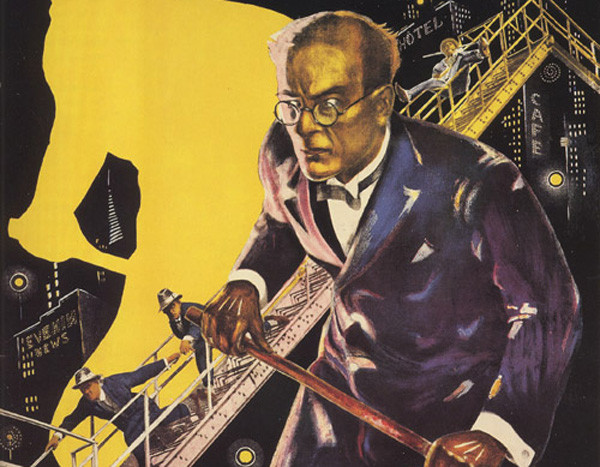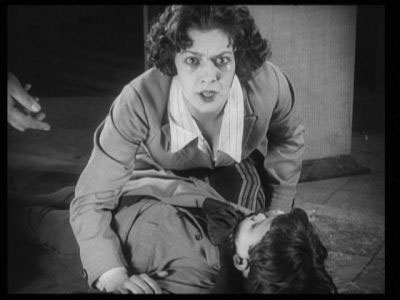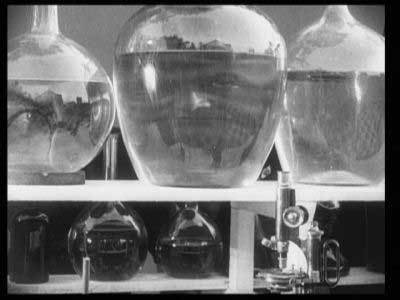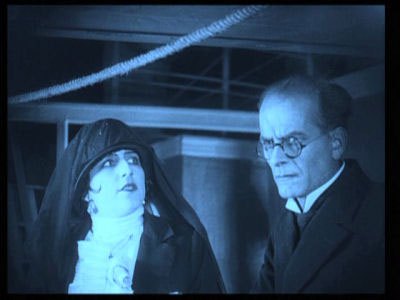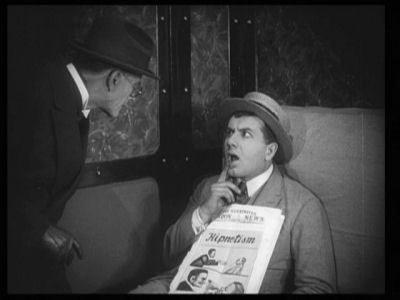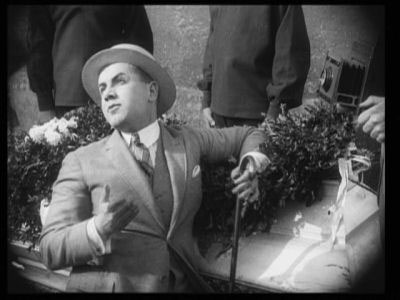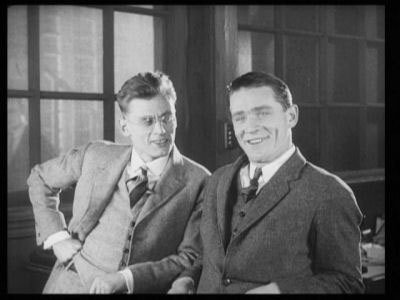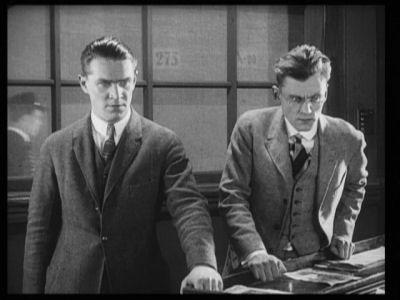A fun curio from a strange time when Soviet filmmakers actively sought to create American-style films. This serial, which owes as much to Germany as it does to the U.S.A., involves a plot by capitalists to poison all of Russia. Sly commentary is hidden among the action and stunts.
Home Media Availability: Released on DVD by Flicker Alley.
They put the “red” in red, white and blue
Miss Mend is a curio from a brief period in Soviet cinema when filmmakers were encouraged to adopt American film techniques to promote Soviet causes. The result is a strange blend of two very different movie styles. Russian films have often excelled in detailed character portraits and moments of deep pathos. Successful America films (then and now) very often embrace spectacle and melodrama: stunts, tears, romance and special effects; the more the better.
So, how does the blend work? Surprisingly well, as it turns out.
The story revolves around an American woman named Vivian Mend (Natalya Gland), a pro-labor activist working as a typist for the powerful Stern family. Vivian has three admirers: Hopkins (Igor Ilyinsky), a clerk who also works for the Sterns; Barnet (played by professional boxer turned actor Boris Barnet, who also co-directed the film), a journalist; and Fogel (Vladimir Fogel), a newspaper photographer.
Miss Mend quickly shows that it has learned the tricks of the trade from American adventure serials: before ten minutes of film have passed, Vivian and her three admirers find themselves running from the police after a labor strike goes very wrong. This first chase scene also establishes the style of the film: give the audience the action and comedy expected from an American serial while extending these elements to the edge of parody.
In spite of the trouble she gets into furthering the cause of labor rights, life is going pretty well for Vivian. She even has a meet-cute with her boss’s son. Arthur Stern (Ivan Koval-Samborsky) is just as smitten with Miss Mend as the rest of the male cast. Not wanting to reveal his identity and spoil his chances, Arthur continues to woo Vivian while pretending to be a lowly engineer.
But what is all this leading up to? Glad you asked!
Soon, Vivian and her friends discover a plot by a band of capitalists led by the wicked Chiche (Sergei Komarov) to attack the USSR with poison gas hidden in radio equipment. Without hesitation, the quartet hop on a boat to Leningrad in hopes of stopping the nefarious scheme.
That, in a nutshell, is the plot of Miss Mend. Of course, recounting every twist and turn of a serial’s plot is not practical. What plays well on film over multiple episodes is not nearly as punchy on paper. Suffice to say however, nothing is what it seems and no one is to be trusted. But you probably knew that already.
The creators of Miss Mend were careful to incorporate as many elements of American serials as possible. Feisty heroine? Check. Cute kid brother? Check. Tenacious reporters? Check. Secret labs? Check. Chases in every vehicle imaginable? Check and double check. What is actually more fascinating about the serial is looking for ways that it diverges from the American serials that so greatly influenced it.
First, of course, I must draw attention to the general film-making technique. American serials were not what you would call the most technically advanced films. Their style was a staid camera, bright lighting and direct angles. Miss Mend is made in the Soviet style: dramatic angles, bold cuts, an agile camera (for the period) and interesting lighting. There is no doubt about it. Miss Mend is a very well-directed film from a technical standpoint. It seems very modern, especially when compared to some of the stagier American films of the period.
This dynamic style greatly helps the action along. This is good, as the plot is a bit weak. The Russian government demanded that Miss Mend incorporate considerable amounts of anti-capitalist propaganda into its plot. It was not enough that Chiche is mad scientist. He must also be a mad scientist backed by powerful American businessmen who will stop at nothing to destroy glorious Russia. It is basically a Red Scare film in reverse. Rather fascinating when viewed in that context.
The problem with this plot element is that all the main characters are Americans. The filmmakers are caught in the impossible bind of glamorizing the Americans while condemning American culture.
Reporters Fogel and Barnet are clever and tenacious in getting a story but the story also condemns them for their single-minded quest for a scoop. Vivian Mend is a brave advocate for workers’ rights but she gives her trust to Arthur Stern, an unrepentant capitalist and loses her beloved nephew as a result. These character contradictions are interesting but rather than enriching the plot, they hobble it. Instead of moving the story forward, the one thing a serial must do, the viewer is instead left with a question of just who they are supposed to be rooting for. I don’t think that even the filmmakers were sure.
Perhaps the best example of this split personality is found at the climax of the serial. Vivian and her three friends pursue Chiche, who is about to carry out his wicked plan. However, they arrive too late. Chiche has already been arrested by the Russians. Then Chiche breaks free and almost escapes but is crushed to death (rather graphically) in an elevator shaft. The American ending would have had the quartet of heroes capturing the villain. The Soviet ending would have ended at Chiche’s arrest by the police. The compromise, that no one gets Chiche, is not nearly as satisfying as either option.
One can only imagine the tremendous pressure that the filmmakers must have been under: Emulate American serials but be sure to wave the Russian flag. However, Miss Mend breaks from American serial convention in other ways and these are far more satisfying. The most obvious change is the romance between Vivian and Arthur.
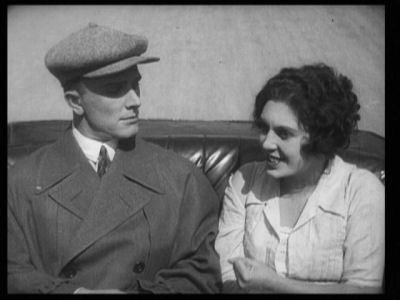
In absence of royalty, American films have always embraced the fall-for-the-boss’s-son plot for their Cinderella stories. Goodness knows I’ve seen enough of them. This plot device is not always bad but it does get a bit stale. In an American serial or feature film, Vivian would have either enjoyed a charming romance with Arthur ending in his revealing his true identity to her delight; or Vivian would have nobly given him up so as not to destroy his career. In Miss Mend, neither happens. Instead, as the serial progresses, Arthur becomes more and more deranged in his hatred of Bolsheviks and his pursuit of Vivian. What started as a crush and subsequent flirtation turns into violent stalking.
Why the difference? The reasons are thoroughly Soviet. As the son of a rich businessman, Arthur is the very embodiment of the social class that Miss Mend is condemning. Just as a socialist in a Red Scare film must renounce his or her political leanings in order to be redeemed, Arthur must renounce his wealth and spoiled lifestyle to have a chance at Vivian. Instead, he embraces revenge against Russians, whom he believes murdered his father.
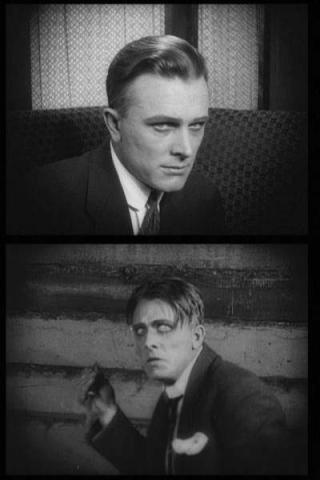
Miss Mend has many nods to German film-making in it and the evolution of Arthur Stern’s appearance is one of them. Arthur’s change from charming businessman to perverted maniac is manifested physically. Clever use of makeup heightens the stylized acting employed to show Arthur’s utter decay from the inside out. It is melodramatic and oh so effective.
Arthur’s decay is a reflection of his father’s. Like his son, Gordon Stern (Mikhail Rozen-Sanin) is obsessed with money and with women, both of which he devours rapaciously. Rumored murdered by Bolsheviks, the elder Stern is actually a victim of Chiche. Stern is chemically resurrected long enough to sign all his money over to Chiche. The elder Stern rises from his coffin in a very Nosferatu-like manner. He is a monster. Like father, like son. Again, pure melodrama but it works.
The heroes and heroine of the serial are considerably more natural in their performances. These contrast nicely with the more stylized mannerisms of Arthur and Gordon Stern as well as the deranged scientists Chiche.
Of the four main “good guy” actors, Igor Ilyinski, who plays the hapless Hopkins, was the most famous. A popular comedian who is sometimes compared to Charlie Chaplin (and probably best known to American audiences as the hapless recipient of A Kiss From Mary Pickford), Ilyinski is actually more similar in style to Oliver Hardy. A heavily built man who was surprisingly light on his feet, Ilyinski’s fussy mannerism and nervous tics create a pleasantly neurotic bit of comedy relief. At times in the serial, Hopkins is maddeningly stupid but that was the way of things in most films of the period, American or Soviet. Comedy Sidekick = Dimbulb. Some things are universal after all.
Boris Barnet provides the heroic romantic lead, the tough guy action, and any needed beefcake while Vladimir Fogel is a more cerebral character, though he sees almost as much action as Barnet. As the three men in Vivian’s life (the non-psychotic ones, anyway) the trio have an enjoyable chemistry and comradery.
Natalya Glan’s performance of the titular Miss Mend is gutsy and natural. However, I wish that she had been allowed to instigate the action a little more often rather than merely reacting to it. Clearly patterned after serial heroines like Pearl White, Glan’s character is smart, fit and bold with just enough naiveté to give her character an interesting flaw. A shame that she was not allowed to create her own destiny a bit more.
Her performance is more effective in scenes of high drama and melodrama, such as her mourning the tragic death of her young nephew at the hands of Chiche or her bold pursuit of the villains across Leningrad. A very physical actress, Glan seems quite at home performing rough and tumble stunts with her male co-stars.
Other elements of the tale that go over particularly well include the running gags and the scenes of panic. The running joke (that Fogel and Barnet get sent to cover a story and return with pictures of Vivian and gushing accounts of her shapely legs, much to their boss’s dismay) is quite cute, as is the Americans’ indignant refusal to cooperate with medical staff when their ship is quarantined. All the while, they are loudly insisting on their rights, what could be more American?
The scenes of panic, when Chiche’s brand of plague is let loose on a passenger ship, is startling, frightening and very memorable. Using rapid cuts and extreme close-ups, the directors convey a claustrophobic sense of terror spreading across the ship. Actors shout “Plague!” directly into the camera, making the horror at being faced with the disease seem immediate.
I also greatly enjoyed the scenes between Fogel and the Russian street urchin who takes him under his wing after he finds himself stranded, alone and penniless in Leningrad. Artful Dodger-type characters always play well. Everyone loves to root for the streetwise kid and this kid is particularly cute. Fogel works well with his young co-star and my only complaint is that the child is not on screen nearly enough to suit me. (Vladimir Fogel is best known outside Russia as the chess-obsessed hero of Chess Fever.)
For all its attempts to emulate American films, Miss Mend fails with basic geography. While the American city where the action takes place is pretty generic, signs and scenery mark it as being in the vicinity of Los Angeles (a club called Valencia, a Pasadena jazz band, etc.). However, characters easily hop a ship sailing directly to Leningrad. Unless the characters round a little thing called the Horn of Africa, cut through the Suez Canal or cross the Bering Strait and then hike across the eastern half of the country, I think that perhaps just sending a warning letter to Russia would save time. Leningrad would certainly not be the target of choice for a west coast criminal mastermind.
Nitpicking. Sorry. California girl complaining here.
In the end, Miss Mend is a mixed bag. Fascinating elements combine with varying degrees of success. It is worth noting that Miss Mend was not a critical success when it was released. Its attempts to blend party rhetoric with American escapism were deemed a failure. With the passage of time, however, the then-current political sentiments have faded and the serial can be appreciated on its own merits.
I highly recommend Miss Mend to serial fans, Soviet cinema fans and anyone who is interested in seeing something a little different. Make that a lot different.
Movies Silently’s Score: ★★★½
Where can I see it?
Miss Mend is available on DVD from Flicker Alley with a delightful score by Robert Israel.
☙❦❧
Like what you’re reading? Please consider sponsoring me on Patreon. All patrons will get early previews of upcoming features, exclusive polls and other goodies.
Disclosure: Some links included in this post may be affiliate links to products sold by Amazon and as an Amazon Associate I earn from qualifying purchases.
